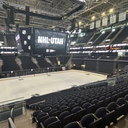Utah's new NHL team was an Arizona money pit

As the Arizona Coyotes decamp to Utah, the team's fraught history in the Phoenix area illustrates a pattern in big-league sports: A city can't get a team without public money, but taxpayer support is no guarantee they'll stay.
Why it matters: Salt Lake City is considering a sales tax hike to cover up to $1 billion in bonds for downtown renovations, including stadium space, for the new hockey team.
- The NHL on Thursday approved the Coyotes' sale to Ryan and Ashley Smith, who own the Utah Jazz. The renamed hockey team will play alongside the Jazz at the Delta Center.
At a Friday news conference, Ryan Smith said the new sports team will "generate a lot of revenue."
- "Down the road, everyone will look back and go, wow, like, in a time when we needed to revitalize, reimagine we invested, and it worked out," he told reporters at the Delta Center.
This is not the team's first foray into publicly funded stadium construction.
Catch up quick: Glendale, Arizona — a Phoenix suburb — borrowed $180 million in 2001 to build the team's arena there as they left Phoenix.
- Taxpayers then paid $25 million in 2010 and 2011 to cover the team's losses and keep them in town for subsequent seasons.
- In 2012, the city agreed to pay $15 million yearly to operate the team's stadium, not long after Glendale had implemented layoffs to cover a budget deficit.
- When the city voided the deal two years later, the team threatened to sue taxpayers for $200 million, which Glendale averted with a more modest contract.
Yes, but: Two years into the new deal, the NHL demanded $225 million from the Arizona legislature for a new arena, saying the team wasn't profitable in Glendale. Attendance was too low to generate many sponsorships. The bill didn't pass.
- The city booted the Coyotes in 2021 after news broke that the team was exploring a Tempe location.
- But last year Tempe voters rejected arena funding effectively ensuring the Coyotes' departure from Arizona.
Friction point: Critics of public funding for the team's Salt Lake home argue hockey is a risky bet in Utah, and city officials should slow down lest taxpayers find themselves backed into a Glendale-esque cycle of payouts to keep the NHL team.
- "These are definitely not salutary investments. They never pay off and it's not worth the public contributions," JC Bradbury, a professor of economics at Kennesaw State University who is critical of taxpayer funding of sports stadiums, told Axios in February.
Reality check: Glendale's location drawbacks don't necessarily apply to Salt Lake, which is more centrally positioned in a less sprawling metro area.
- Glendale also made its initial hockey investments in 2001 under less scrutiny, amid a national wave of public funding for sports venues.
- Those efforts have become more cautious over time, so cities like Salt Lake may be less likely to throw money at a venue that is poised for failure.
- The team also was under different management in Arizona.
Zoom out: The NHL's arrival shouldn't immediately impede Salt Lake's campaign for an MLB team, which also is queued up for public funds, David Berri, an economics professor at Southern Utah University, previously told Axios.
- But funds for a baseball district would also require Salt Lake City's approval — and it's unclear how palatable a second stadium investment would be to taxpayers.
What we're watching: The downtown hockey project has gathered a consensus of support, with Mayor Erin Mendenhall joining state and county officials to promote it.
- But it'll be interesting to see whether city council members, who have to OK the subsidy, get pushback from residents.